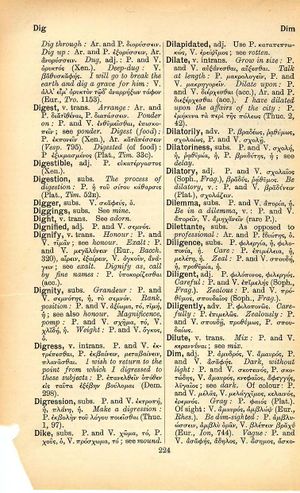dilemma: Difference between revisions
From LSJ
ἡ ὑπόστασίς μου ὡσεὶ οὐθὲν ἐνώπιόν σου → my life is as nothing in respect to you, my life is nothing in thy reckoning
m (Text replacement - "(|thumb)\n(\|link=)" to "$1$2") |
m (Woodhouse1 replacement) |
||
| Line 1: | Line 1: | ||
{{Woodhouse1 | {{Woodhouse1 | ||
|Text=[[File:woodhouse_224.jpg|thumb|link={{filepath:woodhouse_224.jpg}}]] | |Text=[[File:woodhouse_224.jpg|thumb|link={{filepath:woodhouse_224.jpg}}]] | ||
===substantive=== | |||
P. and V. [[ἀπορία]], ἡ. | [[prose|P.]] and [[verse|V.]] [[ἀπορία]], ἡ. | ||
[[be in a dilemma]], v.: [[prose|P.]] and [[verse|V.]] [[ἀπορεῖν]], [[verse|V.]] [[ἀμηχανεῖν]] (rare [[prose|P.]]). | |||
}} | }} | ||
{{Lewis | {{Lewis | ||
Revision as of 09:10, 20 May 2020
English > Greek (Woodhouse)
substantive
be in a dilemma, v.: P. and V. ἀπορεῖν, V. ἀμηχανεῖν (rare P.).
Latin > English (Lewis & Short)
dĭlemma: ătis, n. (δίλημμα),
I a double proposition, a dilemma; in logic, an argument in which an adversary is pinned between two difficulties, Serv. Verg. A. 2, 675, and 10, 449.
Latin > French (Gaffiot 2016)
dĭlēmma, ătis, n. (δίλημμα), dilemme [sorte d’argument] : Serv. En. 10, 449.
Latin > German (Georges)
dilēmma, atis, n. (δίλημμα), der Doppelsatz, eine Schlußart in der Logik, die so von zwei Seiten faßt und zwischen zwei Sätze so einklemmt, daß man notgedrungen sich nach einer Seite hin ergeben (einem von beiden Sätzen beipflichten) muß, Serv. Verg. Aen. 2, 675 u. 10, 449.

